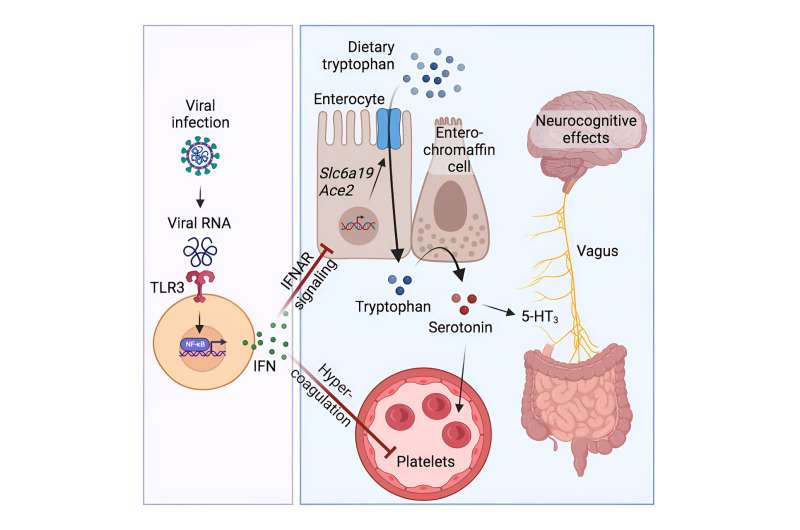This article has been reviewed according to Science X's editorial process and policies. Editors have highlighted the following attributes while ensuring the content's credibility:
fact-checked
peer-reviewed publication
trusted source
proofread
Study finds serotonin reduction causes long COVID symptoms

Patients with long COVID—the long-term symptoms like brain fog, fatigue, or memory loss in the months or years following COVID-19—can exhibit a reduction in circulating levels of the neurotransmitter serotonin, according to new research published today in Cell.
The study, led by researchers from the Perelman School of Medicine at the University of Pennsylvania, sheds new light on the mechanisms of how persistent inflammation after contracting the SARS-CoV-2 virus can cause long-term neurological symptoms.
According to the CDC, nearly one in five American adults who had COVID-19 experience symptoms of long COVID. Most patients complain of brain fog, the inability to focus on tasks, memory problems, general fatigue, and headaches. The mechanisms that cause long COVID have not been studied in depth, and treatments that are widely effective in reducing these long-term symptoms have not yet been developed.
"Many aspects of the basic biology underlying long COVID have remained unclear. As a result, we are lacking effective tools for the diagnosis and treatment of the disease," said senior author, Maayan Levy, Ph.D., an assistant professor of Microbiology at Penn Medicine. "Our findings may not only help to untangle some of the mechanisms that contribute to long COVID, but also provide us with biomarkers that can help clinicians diagnose patients and objectively measure their response to individual treatments."
The pathway from acute COVID-19 infection to long COVID
In a collaboration between Penn's departments of Microbiology, Pathology and Laboratory Medicine, and Physical Medicine and Rehabilitations' Post COVID Assessment and Recovery Clinic, researchers evaluated the effects of long COVID in blood and stool samples from various clinical studies and in small animal models.
The researchers determined that a subset of patients with long COVID had traces of the SARS-CoV-2 virus in their stool samples even months after acute COVID-19 infection, which suggests that components of the virus remain in the gut of some patients long after infection. They found that this remaining virus, called a viral reservoir, triggers the immune system to release proteins that fight the virus, called interferons. These interferons cause inflammation that reduces the absorption of the amino acid tryptophan in the gastrointestinal (GI) tract.
Tryptophan is a building block for several neurotransmitters, including serotonin, which is primarily produced in the GI tract and carries messages between nerve cells in the brain and throughout the body. It plays a key role in regulating memory, sleep, digestion, wound healing, and other functions that maintain homeostasis within the body. Serotonin is also an important regulator of the vagus nerve, a system of neurons that mediate the communication between the body and the brain.
The researchers found that when tryptophan absorption is reduced by persistent viral inflammation, serotonin is depleted, leading to disrupted vagus nerve signaling, which in turn can cause several of the symptoms associated with long COVID, such as memory loss.
Revealing possible targets for long CVOID treatments
"Clinicians treating patients with long COVID have been relying on personal reports from those patients to determine if their symptoms are improving. Now, our research shows that there are biomarkers we may be able to use to match patients to treatments or clinical trials that address the specific causes of their long COVID symptoms, and more effectively assess their progress," said co-senior author, Sara Cherry, Ph.D., a professor of Pathology and Laboratory Medicine.
The authors took this insight one step further, to identify if replenishing tryptophan or serotonin in patients who exhibit deficiencies could treat long COVID symptoms. They demonstrated that serotonin levels could be restored, and memory impairment reversed, in small animal models through treatment with serotonin precursors or selective serotonin reuptake inhibitors (SSRIs).
"There has been some evidence to suggest that SSRIs could be effective in preventing long COVID, and our research now presents an opportunity for future studies to select specific patients for a trial who exhibit depleted serotonin, and to be able to measure response to treatment," said co-senior author, Benjamin Abramoff, MD, MS, director of the Post-COVID Assessment and Recovery Clinic, and an assistant professor of Clinical Physical Medicine.
Furthermore, uncovering how viral infection impacts the absorption of tryptophan presents more opportunities for additional research into the other processes that tryptophan influences. While this study focused on serotonin, tryptophan is a building block for many other important metabolites, like niacin, which helps the body turn food into energy, and melatonin, a hormone which regulates circadian rhythms and sleep.
"Long COVID varies from patient to patient, and we don't fully understand what causes the differences in symptoms," said co-senior author, Christoph Thaiss, Ph.D., an assistant professor of Microbiology. "Our study provides a unique opportunity for further research to determine how many individuals with long COVID are affected by the pathway linking viral persistence, serotonin deficiency, and dysfunction of the vagus nerve and to uncover additional targets for treatments across the different symptoms patients experience."
More information: Andrea C. Wong et al, Serotonin reduction in post-acute sequelae of viral infection, Cell (2023). DOI: 10.1016/j.cell.2023.09.013





















